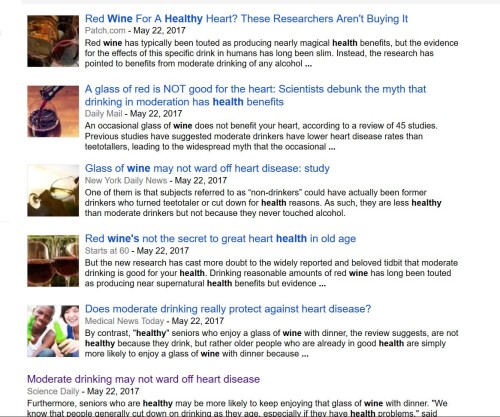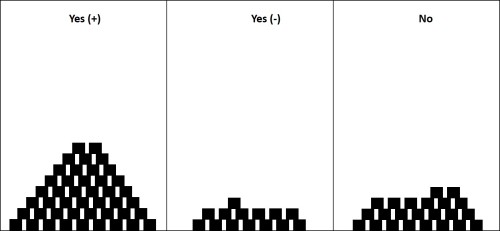Until there is definitive evidence that the unique matrix or “chemical soup” of wine, by itself, leads to healthier outcomes for individuals, we need to stop with this “wine is healthy” talk. The only thing we can say for sure at this point of the scientific path is that a healthy individual probably won’t suffer any negative outcomes by moderately drinking, preferably with food, and not as an attempt to alleviate stress. Admittedly, I’m the one pushing last point, but I have good evidence and following that advice definitely will not hurt you. Having said that…
Are people saying wine is good or bad for you today? I can never keep up. According to some Google searches, on May 21, 2017 all of the “news” sources that I’ve never heard of viewed wine as health savior, but on May 22, 2017, that all changed. The Journal of Studies on Alcohol and Drugs published two articles the day before looking at the potential associations between moderate drinking and long-term cardiovascular health. Both of these articles were critical of how numerous studies conducted previously that suggested (not proved) there is a link between light to moderate drinking and reduced rates of cardiovascular disease may have made a common error in research by assuming that the results seen in the groups of individuals studied were widely applicable to everyone in the general population. And then this happened:

First, neither of the papers were about wine specifically so let’s tone it down “Starts at 60” (Tag line: “Australia and New Zealand’s, and increasingly, the worlds largest digital media platform for over 60s.”). Second, neither of these papers proved or even attempted to prove that there is no association between wine and long-term cardiovascular health. The edition of the journal these articles were published in even opens with the following text (red text mine):
This issue of the journal contains two articles with three associated commentaries on the yet-unanswered question of the association between moderate drinking and cardiovascular health as well as general mortality.
Third, the idea that a single food or drink item should be deemed “Healthy” or “Not healthy” is beyond ludicrous because that’s just not how health works.
In general, this see-sawing you see in the news about whether something is healthy or not is a result of misinterpretations of what the results of a single study or small number of studies say. Most journalists aren’t great at interpreting scientific literature unless they also have a science background; wine and food writers are especially bad. As a general rule of understanding scientific research: the more studies that are conducted on a particular question, the less likely any single study is going to contradict all of the research performed before it. For example, let’s take a look possible outcomes of the question: Is there an association (relationship) between moderate drinking and cardiovascular health?
- Yes, there is a positive association between moderate drinking and cardiovascular health. (This means moderate drinking could make you heart-healthy)
- Yes, there is a negative association between moderate drinking and cardiovascular health. (This means moderate drinking could make you heart-unhealthy)
- No, there is no association between moderate drinking and cardiovascular health. (This means being a moderate drinker in itself won’t determine your heart health)
The results of every study conducted on this question will add evidence to one of these possible outcomes. I generally visualize this as each study producing a single cube of evidence of roughly the same size/weight/volume as any other study that gets filed into one of the outcome columns. Why the same size/weight/volume? Because an important aspect of the scientific process is that an experiment is repeatable. The process is highly democratic in this respect which means that a single study cannot overturn the bulk of work done through previous studies. A single study can influence future studies to be done to repeat the results however, which could lead to a turning of the tide, so to speak, but this process takes time.

*Not actually representative of the current body of evidence no matter how much we want it to be true.
It is also important to note that in the scientific method there is no point where testing is stopped which is why declarative statements that an ultimate truth have been found are foolhardy. Yet, there are times when the body of evidence is so large and convincing that it paints a picture of an inevitable outcome. In other words, the pile of evidence is so vast in one column that the chances of that changing are slim to none. Human-caused climate change, no association between vaccines and autism, an association between tobacco use and cancer, the theory of evolution, Aaron Berdofe being a pretty cool guy…these are all areas where the evidence paints a clear picture of the inevitable outcome.
But, as the Journal of Studies on Alcohol and Drugs pointed out, we just don’t have a clear picture yet on if there is an association between moderate alcohol consumption and cardiovascular health and general mortality. Same goes for most health related questions about alcohol. The only certain thing we know about our relationship with alcohol is that if we drink too much we can permanently damage ourselves and perhaps die. How we define “too much” varies by individual, but that’s why we have population health recommendations about how much is too much. To a somewhat lesser degree of certainty, we also know that there seem to be few negative consequences to drinking lightly or moderately. Again, thresholds and circumstances affecting that may vary.
None of this changes the the fact that wine drinkers just want to believe that wine will ultimately make them healthier people. It’s perfectly natural to hope that our potential problems in the future can be alleviated by either doing nothing or continuing to do the things we currently enjoy. I do believe that it is within this shared hope amongst wine drinkers that we write articles extolling the health benefits of wine, sell wine by incorporating it in the idea of being part of a healthy meal, or lecture beer drinkers on why wine is better. I don’t think wine professionals or yes, even health/wellness professionals are being sinister when repeating incorrect or perhaps misleading statements regarding the relationship between wine and health*, but I do wish we’d all start being a little more thoughtful when talking about the topic.
If you are a wine professional, I would recommend you stop using binary descriptors when discussing wine and health like good/bad and healthy/unhealthy. Adding or subtracting wine to a person’s diet, as we understand it today, does not make that person’s diet healthier or unhealthier. Are there some interesting interactions that happen when we drink wine that have what we consider to be positive effects on our bodies? Yes, certainly. There are also some effects we consider to be negative as well, but it’s very complex and research is underway to figure out in exactly what conditions those effects will take place.
It’s also good to remember that what the research says and what the headlines say are not always in alignment. For example, the studies I first referenced about 1,000 words don’t conclude as the headlines purport that wine is “NOT good for the heart”. They do suggest that some of the cubes of evidence presented to the “Good for your heart” column (Yes +) maybe need more work done before they can officially be put there. I would at least recommend reading the parts of the study referenced in an article labeled “Abstract” and “Results” if you can. Frustratingly though, most writers fail to provide a reference link to the original study they are basing their article off of. Another frustrating road block you may run into is that the study is behind some journal’s paywall and I doubt you’ll want to pay the $25 to read it. For that, all I can do is apologize for the world and let you know we’re working on it.
Therefore, until the number of studies performed and the results of those studies give a definitive picture to the question of how wine may affect our long-term health the best answer to give someone asking is a good shrug and tell someone that unless their doctor says otherwise, moderate drinking isn’t going to negatively affect you and too much will obviously kill you. Of course, if you want to put a twinkle in your eye along with a sly grin and whisper “Maybe there’s something to it…” before taking a thoughtful sip of a particularly enchanting glass of wine, I won’t stop you. Gourmand’s are willing to take the risk for pleasure, but do they do know there is a risk.
*There are a few companies these days claiming they can prevent headaches or hangovers from wine and there is simply no scientific evidence to back up their claims. This is somewhat sinister and potentially in violation of Truth In Advertising laws.